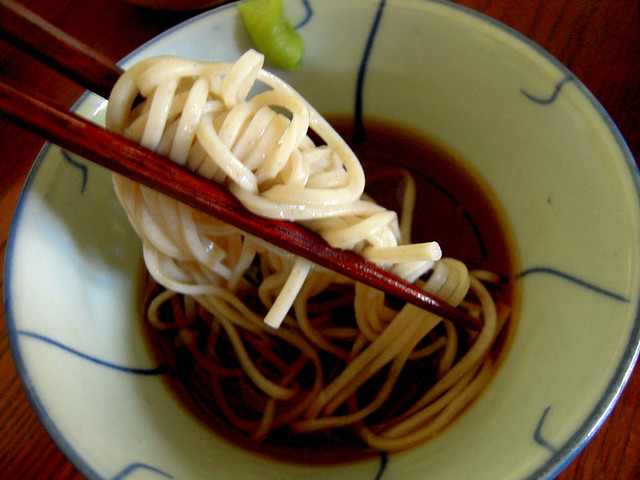
As 2011 draws to a close, I am not thinking about the Mayans. Rather, I am trying to decide what I will be eating over the weekend. PRIORITIES, people!
I'll be working on Saturday evening (apocalypse be damned!), but I'll have all the accouterments ready to ring in the new year with Johnny and a bowl of
toshikoshi soba as soon as I get home. With a bottle of bubbly of course!
Toshikoshi soba is always eaten on New Year's Eve in Japan.
Toshikoshi roughly means, "to kill off the year", and so you can start the new year with a clean slate. "Why soba?", I asked my mother. Hideko thinks the soba represents living
hosoku,
nagaku (slenderly, long). She hung up on me before I could ask any more questions regarding this matter of living "slenderly".
I bought this fancy
shin soba (new soba) in Nagano prefecture, when I was there in November. Nagano is well known for their soba. The notion of "new soba" is interesting -- essentially, it is soba made of newly harvested buckwheat.
Shin soba is quite a specialty in Japan, as the Japanese love anything "new".
I figure December 31 will be a good time to break open the seal (erm, before it expires).
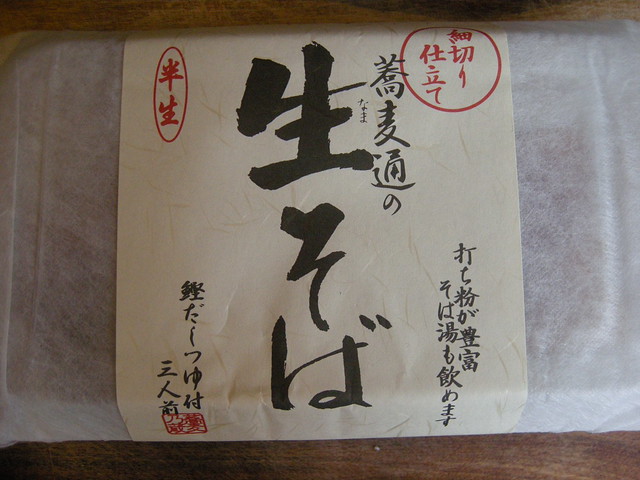
Yes, the strands of soba are slender and long.
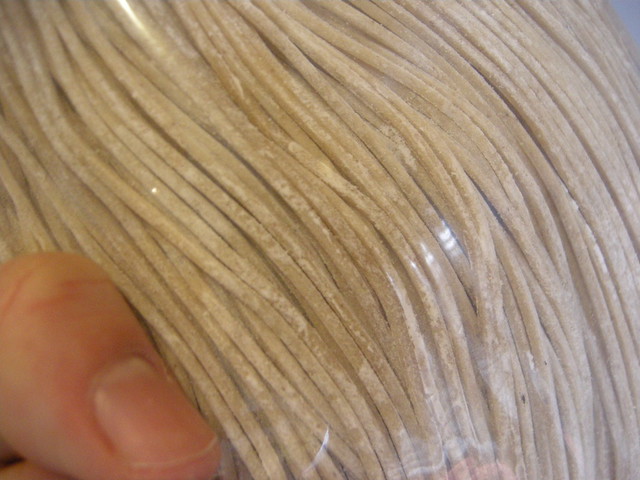
It is a treat to have fresh soba, as I usually eat the hard stuff throughout the year. I'll be making Yoko's
soba tsuyu (dipping sauce), and eating the soba cold. Traditionally,
toshikoshi soba should be served warm, but I prefer mine cold. That's how Hideko usually served it, anyhow. Although
zaru soba (cold soba) in the winter time is pretty blasphemous.
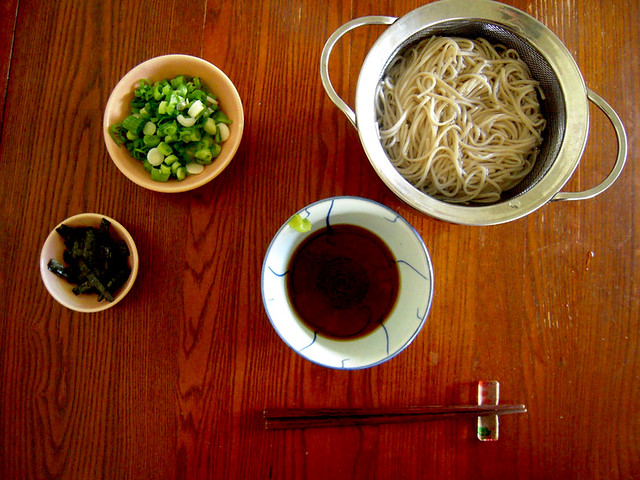 Photo by Yoko Kumano
Photo by Yoko Kumano
Happy new year, Martians! Thanks for all your support in this last year. Umamimart will turn 5yo in 2012. Wow! I look forward to sharing more food adventures with you in the new year.
*Top photo by Yoko Kumano
 As 2011 draws to a close, I am not thinking about the Mayans. Rather, I am trying to decide what I will be eating over the weekend. PRIORITIES, people!
I'll be working on Saturday evening (apocalypse be damned!), but I'll have all the accouterments ready to ring in the new year with Johnny and a bowl of toshikoshi soba as soon as I get home. With a bottle of bubbly of course!
Toshikoshi soba is always eaten on New Year's Eve in Japan. Toshikoshi roughly means, "to kill off the year", and so you can start the new year with a clean slate. "Why soba?", I asked my mother. Hideko thinks the soba represents living hosoku, nagaku (slenderly, long). She hung up on me before I could ask any more questions regarding this matter of living "slenderly".
I bought this fancy shin soba (new soba) in Nagano prefecture, when I was there in November. Nagano is well known for their soba. The notion of "new soba" is interesting -- essentially, it is soba made of newly harvested buckwheat. Shin soba is quite a specialty in Japan, as the Japanese love anything "new".
I figure December 31 will be a good time to break open the seal (erm, before it expires).
As 2011 draws to a close, I am not thinking about the Mayans. Rather, I am trying to decide what I will be eating over the weekend. PRIORITIES, people!
I'll be working on Saturday evening (apocalypse be damned!), but I'll have all the accouterments ready to ring in the new year with Johnny and a bowl of toshikoshi soba as soon as I get home. With a bottle of bubbly of course!
Toshikoshi soba is always eaten on New Year's Eve in Japan. Toshikoshi roughly means, "to kill off the year", and so you can start the new year with a clean slate. "Why soba?", I asked my mother. Hideko thinks the soba represents living hosoku, nagaku (slenderly, long). She hung up on me before I could ask any more questions regarding this matter of living "slenderly".
I bought this fancy shin soba (new soba) in Nagano prefecture, when I was there in November. Nagano is well known for their soba. The notion of "new soba" is interesting -- essentially, it is soba made of newly harvested buckwheat. Shin soba is quite a specialty in Japan, as the Japanese love anything "new".
I figure December 31 will be a good time to break open the seal (erm, before it expires).
 Yes, the strands of soba are slender and long.
Yes, the strands of soba are slender and long.
 It is a treat to have fresh soba, as I usually eat the hard stuff throughout the year. I'll be making Yoko's soba tsuyu (dipping sauce), and eating the soba cold. Traditionally, toshikoshi soba should be served warm, but I prefer mine cold. That's how Hideko usually served it, anyhow. Although zaru soba (cold soba) in the winter time is pretty blasphemous.
It is a treat to have fresh soba, as I usually eat the hard stuff throughout the year. I'll be making Yoko's soba tsuyu (dipping sauce), and eating the soba cold. Traditionally, toshikoshi soba should be served warm, but I prefer mine cold. That's how Hideko usually served it, anyhow. Although zaru soba (cold soba) in the winter time is pretty blasphemous.
 Photo by Yoko Kumano
Happy new year, Martians! Thanks for all your support in this last year. Umamimart will turn 5yo in 2012. Wow! I look forward to sharing more food adventures with you in the new year.
*Top photo by Yoko Kumano
Photo by Yoko Kumano
Happy new year, Martians! Thanks for all your support in this last year. Umamimart will turn 5yo in 2012. Wow! I look forward to sharing more food adventures with you in the new year.
*Top photo by Yoko Kumano



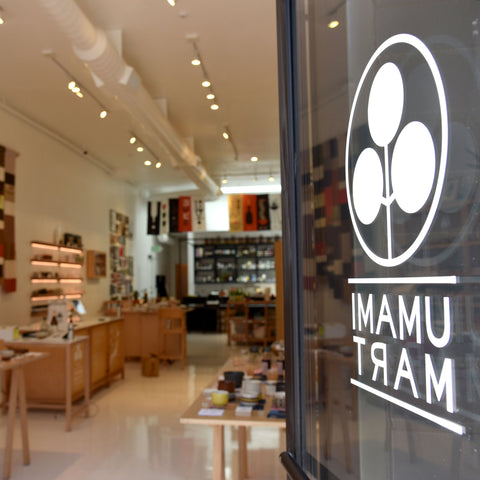
Comments (8)
I’m coming over on New Year’s Day for soba!
I can’t wait to start our new year together over some Soba!
It is not necessary to serve toshikoshi soba warm. You can eat Toshikoshi soba any style you like. It is most important that you finish eating the soba by 12am. 良いお年を!(Have a nice new year!)
The hosoku-nagaku thing was everything my dad hated about Japanese culture. He was definitely in the “play hard, die hard” camp. The slender/thin thing is meant to be the most unbothersome thing to do. You don’t want to “live thick” because that means you are impeding on others or “bothering” others by being out of the ordinary or outspoken. And when you DO die everyone is obsessed with “pinkoro” which means you die subtly and without much fuss like a marble that has rolled off a tray.
@Yoko: Your dad was totally right about that. Of course you shouldn’t bother people around you, but everyone should have the guts to choose their own path even if it’s out of the ordinary. But to many Japanese that is a very scary thing.
I hope everyone will enjoy a super cozy oshougatsu time.
Happy new year! Love from Anders
(who’s writing this on a train to Stockholm for a last minute spontanous Northern New Year’s party – will report on UM soon)
How exciting! Must be so cold over there happy new year!
Pinkoro – so funny but also so sad.
I don’t actually ever think of how I would prefer to die, but living thinnly sounds boring.